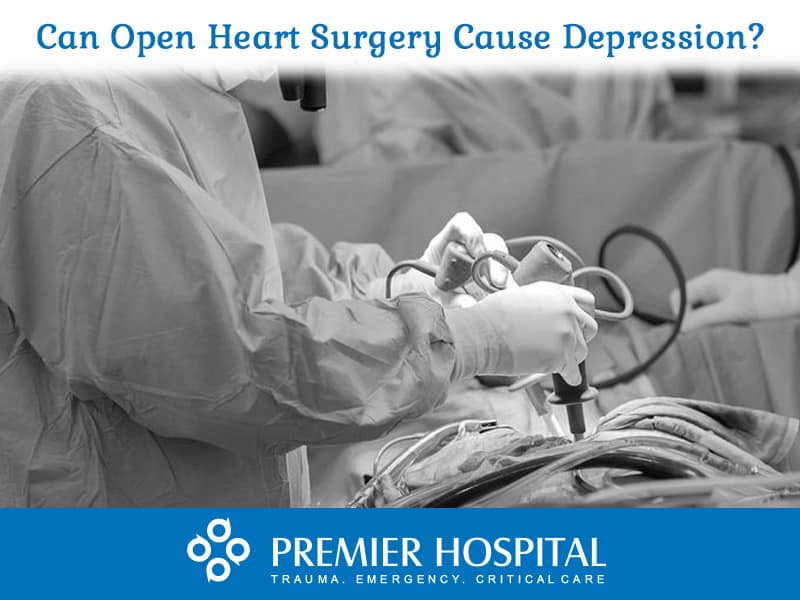Can Open Heart Surgery Cause Depression?
by Premier Hospitals | August 29, 2019 |
Are You feeling Lonely after open-heart surgery? Do all patients have to suffer depression after open-heart surgery? This blog will provide you with the details regarding depression that occurs if you underwent heart surgery, or feeling some anxiety once you are at home undergoing recovery. Research has shown that around 30% to 40% of all open-heart surgery cases be it major or minor are affected by depression. It is common to feel depressed after a heart attack, surgery or heart surgery, and any recent hospitalization, or new diagnosis of any disease. The feeling of temporary sadness is normal and will slowly disappear within a few weeks after returning to your regular and routine activities. However, a depressed mood can sometimes prevent you from living a healthy life. If your mood is depressed and accompanied by other symptoms that occur every day for two weeks or more, care is needed to help you cope better and recover. Postoperative depression must always be taken seriously. This is a complication that can occur after any type of operation. However, many doctors do not warn their patients about this risk. Despite the development of new technology in medical sciences and in surgery, still after coronary artery bypass, depression is an important independent predictor. It can be pre or postoperative and must be monitored carefully and treated if necessary. Psychological assessment before and after surgery can be a cheap and relatively simple way to save lives. The whole process of surgery can affect a person's mental health. This feeling can last after surgery if not treated properly. Depression: Mental disorders are characterized by being continuously depressed or loss of interest in activities that cause significant damage to daily life.
Depression and Open Heart SurgeryÂ
Mental disorders are characterized by being continuously depressed or loss of interest in activities that cause significant damage to daily life.
Depression and Open Heart SurgeryÂ
Depression and Open Heart Surgery often go together.
People who live alone or are lonely after surgery may have a higher risk of having depression than people who have family and friends support. Depression management helps you recover better. This can reduce the risk of more heart problems after the surgery and help you stay healthy. Causes of Depression After Open Heart Surgery: There are many reasons why a person may suffer from depression post-surgery.
After surgery, symptoms of depression can be associated with:
There are many reasons why a person may suffer from depression post-surgery.
After surgery, symptoms of depression can be associated with:
- Reaction to anaesthesia
- Chronic Pain and discomfort during recovery
- The body's response to certain painkillers and antibiotics
- Physical, mental and emotional stress caused by surgery
- Thinking about the possibility of one's own death
- Won't have an interest in favorite activities
- Lack of energy
- Insomnia or excessive sleep
- Change in appetite
- Emphasize the possibility of a negative result
- Nervousness or being tense
- Feelings of anger, fear or panic
- Irritability
- Muscles twitch or tremble
- Difficulty in thinking clearly or focusing
 Up to 15% of patients with cardiovascular disease and up to 20% of patients undergoing open-heart surgery suffer from severe depression. Research studies have shown that mental stress hurts human heart health.
Up to 15% of patients with cardiovascular disease and up to 20% of patients undergoing open-heart surgery suffer from severe depression. Research studies have shown that mental stress hurts human heart health.
- In one important study, continued depression due to the risk of death increased to 17% within six months after stroke (3% of deaths in patients with heart attacks did not experience depression).
- In people with heart disease, depression can increase the risk of unwanted heart events such as heart attacks or blood clots. In people without heart disease, depression can also increase the risk of heart attack and the development of coronary heart disease
- Risk factors for cardiovascular disease, platelet reactivity, reduced cardiac variability and increased pro-inflammatory markers (such as C-reactive protein or CRP), are shown as increased in patients with depression
- Uncontrolled stress can cause high blood pressure, arterial damage, irregular heart rhythms, and a weakened immune system.
- Patients with heart disease and depression also suffer from poorer health status. Also, patients with heart disease with depression have bad exercise and treadmill adherence than patients with no depression with heart disease
- During recovery from heart surgery, depression can increase pain, exaggerate fatigue, and lethargy. Patients who had open-heart surgery and untreated postoperative depression also experience increased morbidity and mortality.
- Patients with heart failure and depression are at an increased risk of hospitalization and an increased risk of death.
- It has been shown that depression is a risk factor for heart disease so all heart patients are screened for depression with simple screening questions and sample research questionnaires. Questions can be about eating or sleeping habits, emotional stability, energy levels, thought patterns
- Depression is connected with negative lifestyle habits such as smoking, lack of physical activity, excessive alcohol consumption, lack of social support, and poor diet. It also inhibits the treatment of heart disease.
- Preliminary studies show that there may be genetic factors that increase the risk of depression and the risk of a recurrent heart attack.

- See your doctor regularly following the appointments
- Go outside and enjoy the environment around you
- Focus on the positive
- Exercising regularly
- Sticking to a sleep schedule
- Dealing with emotions
- Staying healthy by avoiding smoking and alcohol















